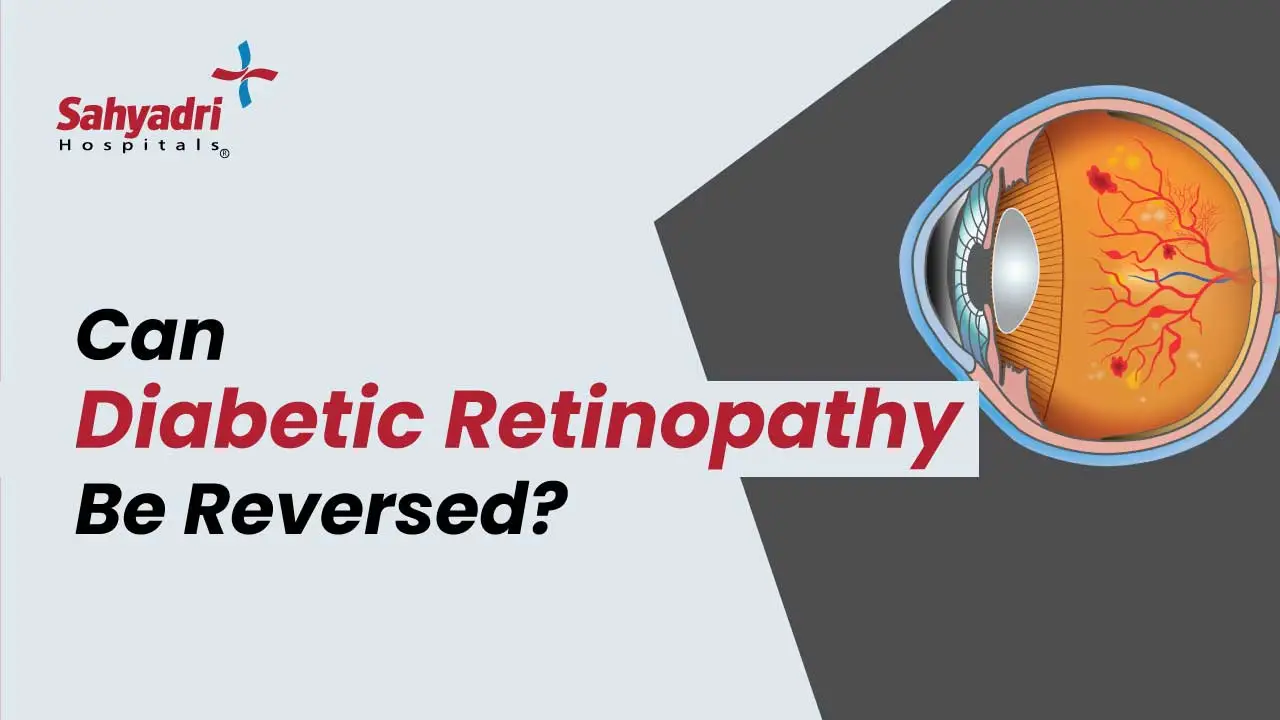Home > Blogs > Endocrinology > Can Diabetic Retinopathy Be Reversed
Can Diabetic Retinopathy Be Reversed?

Dealing with diabetes can be difficult, but it’s important to stay informed about all of the potential complications. One such complication is diabetic retinopathy, which if left untreated can lead to blindness.
Fortunately, recent research and advancement in therapies has been promising for diabetes patients who are worried about developing diabetic retinopathy – the condition may be reversible in some cases. Yes, you heard it right.
In this post, we will explore what causes diabetic retinopathy and treatments available that may be able to reverse the progression of this condition. We will also discuss what you can do to protect your vision if you are a diabetic. Plus, we will look at some promising recent research on reversing the condition. Keep reading to learn more!
What is diabetic retinopathy?
Diabetic retinopathy is a progressive eye condition that can lead to vision loss and even blindness. It is caused by changes in the blood vessels of the retina, the light-sensitive tissue at the back of the eye.
In early stages, diabetic retinopathy may cause no symptoms or only mild vision problems. But as the condition progresses, it can lead to more serious problems, such as blurred vision, difficulty seeing at night, and eventually complete loss of vision.
One in eight persons above 50 years in India is a diabetic; One in every 46 diabetics is blind; and one in seven has some form of impairment in their vision due to high blood sugar levels, according to a diabetes and diabetic retinopathy survey by the All India Institute of Medical Sciences (AIIMS) in collaboration with Ministry of Health and Family Welfare carried out between 2015 to 2019.
Also Read: Why Is Diabetes Awareness So Important?
What causes diabetic retinopathy?
Diabetic retinopathy is caused by changes in the blood vessels of the retina. These changes are usually related to diabetes.
High blood sugar levels from diabetes can damage small blood vessels in the body, including those in the retina. This damage can cause the vessels to leak fluid or even bleed. In addition, high blood sugar levels can also cause new blood vessels to grow in the retina.
These changes in the retina’s blood vessels can lead to diabetic retinopathy. If left untreated, diabetic retinopathy can progress and eventually lead to vision loss or even blindness.
Have queries or concern ?
Can diabetic retinopathy be reversed?
Yes, in some cases, diabetic retinopathy can be reversed. Prompt treatment can help prevent or delay vision loss from diabetic retinopathy.
If you have diabetes, it’s important to control your blood sugar levels and see your doctor regularly. If you have early signs of diabetic retinopathy, treatments are available that may help reverse the progression of the condition.
One such treatment is laser surgery. Laser surgery can help shrink abnormal blood vessels in the retina and stop them from leaking fluid. In some cases, laser surgery can also stop new blood vessels from growing.
Another treatment option for diabetic retinopathy is intravitreal injections. These injections are a type of medication that is injected into the eye. Intravitreal injections can help stop the progression of diabetic retinopathy by reducing inflammation and preventing new blood vessels from growing.
In some cases, surgery may be needed to treat diabetic retinopathy. Surgery is usually only recommended if other treatments have failed or if the condition is causing severe vision loss.
Also Read: Is it possible to Reverse Diabetes?
What can you do to protect your vision if you have diabetes?
If you have diabetes, there are several things you can do to help protect your vision –
- Control your blood sugar levels. Keeping your blood sugar levels under control is the most important thing you can do to prevent or delay the onset of diabetic retinopathy.
- See your doctor regularly. Seeing your doctor for regular checkups is important so that any early signs of diabetic retinopathy can be detected and treated.
- Quit smoking. Smoking can increase your risk for developing diabetic retinopathy, so quitting smoking is an important step in protecting your vision.
- Eat a healthy diet. Eating a healthy diet can help control your blood sugar levels and protect your overall health.
- Exercise regularly. Exercise can help control your blood sugar levels and improve your overall health.
- Get regular eye exams. Getting regular eye exams is important so that any early signs of diabetic retinopathy can be detected and treated.
Recent research on reversing diabetic retinopathy
There is some promising recent research on reversing the effects of diabetic retinopathy.
In one study, researchers found that a combination of the drugs bevacizumab and ranibizumab was effective in reversing the effects of diabetic retinopathy. The study found that the combination of drugs was more effective than either drug alone.
In another study, researchers found that the drug aflibercept was effective in treating diabetic retinopathy. The study found that aflibercept was more effective than ranibizumab in treating the condition.
These studies show that there is some promising research on reversing the effects of diabetic retinopathy. However, more research is needed to confirm these findings.
Patient Feedback
Great doctors, Good facilities, caring and helping staff. I recommend this hospital for day care services.
![]()
![]()
Sangram Shinde
All doctors r very good. There treatments is best. Other staff also good. The service of nurses is great...Hospital is always clean.
![]()
![]()
Vaishali Aitawade
All services provide by hospital are nice and on time. Doctors are polite and co-operative with patient.
![]()
![]()
Ankita Jagtap
All services provided by hospital is good. Hygiene maintained well.Even at night good care provided.
![]()
![]()


